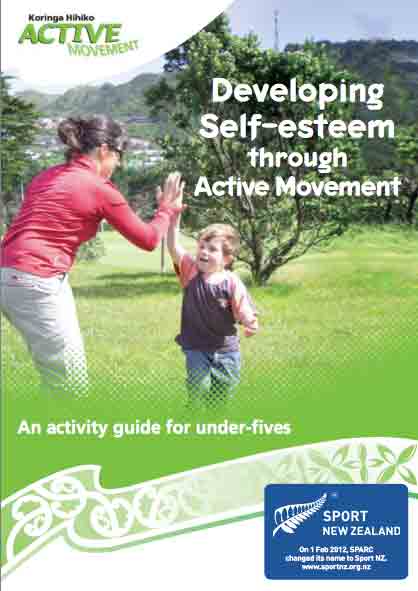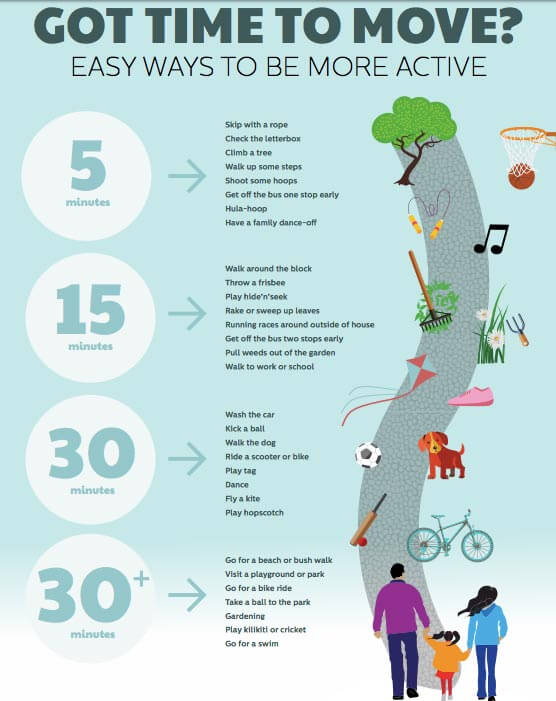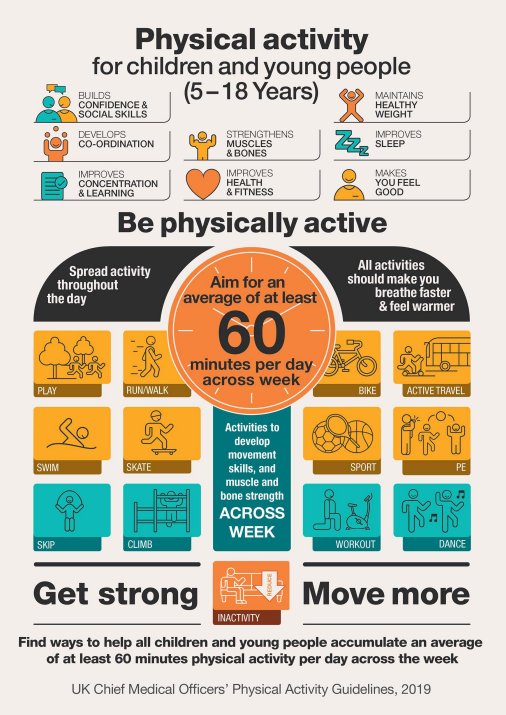Active children
Key points about active children
- Both children and adults need to be physically active and eat healthily to live well.
- Parents, family/whānau and caregivers, check out the tips and videos below and discover more about how to make sure your children exercise right so they can grow well.

Get active daily
Daily physical exercise will keep your child healthy. Children should do a minimum of an hour of mild to intense physical activity every day. Try for plenty of mild exercises and some intense physical activities. This will help them to:
- Grow healthy, strong bones, muscles, and joints.
- Increase flexibility and balance.
- Grow and sustain healthy lungs and heart.
- Keep a healthy weight.
- Make friends and enjoy themselves.
- Develop good self-esteem.
Mild exercise
Children will be breathing more quickly and their heart rates will be a little bit faster. A good indicator of a mild level of exercise would be that your child can still talk with you whilst exercising. Try these suggestions:
- walking the dog
- bike ride in the park
- swimming in the pool
- playing on the playground
- dancing
- Kapa haka
- surfing, bodyboarding, or skim boarding at the beach
- skateboarding.
Harder exercise
Children will be puffed and their heart rates will be faster than during mild exercise (above).
A good indicator of a hard level of exercise would be that your child will only be able to say a couple of words to you and then will need to take a breath. Try these suggestions:
- running games such as bull rush or tag
- hiking
- swimming laps at the pool
- soccer, rugby
- playing touch rugby with friends, family/whanau
- Waka ama.
Encourage physical exercise
- Provide chances for your children to be physically active every day, with play, cultural events, dance, sports, creative games around the house, household chores, and when travelling (e.g. riding a bike to school, walking to a friends, scooting or skateboarding to the dairy).
- Try a range of activities to discover the ones that your child likes most. Encourage your child in every activity and offer positive feedback.
- Engage in physical activity as a family and let every family member have a turn in choosing an activity to try.
Turn technology off
Try to limit your child's ʻscreen timeʼ (TV, mobile phone, video games, movies) to under 2 hours a day. Try to inspire children to be active in a range of ways and as much as possible.
Be a role model
Your children look up to you, if you're physically active every day, this will most likely rub off on your children and make them more active too.
If you're ever unsure – consult your:
- GP, practice nurse, public health nurse.
- Nearest District Health Board and request a dietitian or Public Health Service.
- Māori/Pacifica health workers and/or marae-based health services.
Video: Sit Less, Move More, Sleep Well: Mokomoko
Video: HANDS UP | 1 - Introduction to Physical & Health Literacy
Video: HANDS UP | 2- Exploring Physical & Health Literacy
Video: HANDS UP | 3 - Applying Physical & Health Literacy
Physical activities for under 5's(external link) Sports NZ
Activities for children and young people(external link) Health NZ | Te Whatu Ora, 2017
Games for kids(external link) Health Promotion Agency
Developing fundamental movement skills for children(external link) Sport NZ
Play, sport and physical activity for young people(external link) Sport NZ
Supporting Physical Development in Early Childhood(external link) Future Learn. Fee applies. The course is designed for adults involved in caring for or educating babies and young children.
Resources
- Developing self-esteem through active movement(external link)(external link) Sport NZ, 2012
- Got time to move? Easy ways to be more active(external link) Health Promotion Agency, NZ, 2024
- Physical activity for children and young people (5 — 18 years)(external link)(external link) GOV UK, 2019
- Sit less, move more, sleep well – active play guidelines for under-fives – Owhaowha (infants) 3-12 months(external link) Ministry of Health, NZ, 2018 English(external link), te reo Māori(external link)
- Sit less, move more, sleep well – active play guidelines for under-fives – Tamaiti pūhou (babies) 0-3 months(external link) Ministry of Health NZ, 2018 English(external link),
te reo Māori(external link) - Sit less, move more, sleep well – active play guidelines for under-fives – Tamaiti (pre-school) 3-4 years(external link) Ministry of Health NZ, 2018 English(external link), te reo Māori(external link)
- Sit less, move more, sleep well – active play guidelines for under-fives – Tamaiti nohinohi (toddlers) 1-2 years(external link) Ministry of Health NZ, 2018 English (external link), te reo Māori(external link)
- The importance of play(external link) Sports NZ, 2017
- Walking, running and jumping(external link) Sport NZ, 2009. Research shows that allowing your child to walk in their own time is important. This brochure includes fun activities for toddlers and young children when they are walking, running and jumping. English(external link), te Reo Māori(external link)
- Active movement – an introduction(external link) Sport NZ, 2008. How to encourage your children to become active. English(external link), te reo Māori(external link)
- Developing hands and fingers (external link)Sport NZ, 2008. Why developing hands and fingers is important for children. Includes fun activities for newborns and infants, toddlers and young children. English(external link), te reo Māori(external link)
- Developing self-esteem through active movement (external link)Sport NZ, 2008. Why your child’s self esteem is important and includes fun activities for newborns and infants, toddlers and young children.
- Developing language through active movement(external link) Sport NZ, 2008. Quality physical movement can improve language development. This brochure includes fun activities for newborns and infants, toddlers and young children. English(external link), te reo Māori(external link)
- Upper body development – climbing, hanging, and swinging(external link) Sport NZ, 2008. Information on the development of strong muscles in the shoulders, arms, hands and fingers. Includes fun activities for newborns and infants, toddlers and young children. English(external link), te reo Māori(external link)
- Tummy time, rolling, and crawling(external link) Sport NZ, 2008. These movements are a vital part of your children's development. English(external link), te reo Māori(external link)
- Balance –swinging, spinning, and rocking(external link) Sport NZ, 2008. Movement such as swinging, spinning and rocking helps develop your child's sense of balance. English(external link), te reo Māori(external link)
- Catching, throwing, and kicking(external link) Sport NZ, 2008. Why playing with a ball or moving object is important. English(external link), te reo Māori(external link)
- Using the environment(external link) Sport NZ, 2008. This brochure explains that using the environment is important. English(external link), te reo Māori(external link)
References
- Food and nutrition guidelines for healthy children and young people (aged 2–18 years) – a background paper.(external link) Ministry of Health NZ, partially revised 2015
- Active movement activity guides for children 0-5 years(external link) Sport NZ, 2015
Brochures

Sport NZ, 2012

Health Promotion Agency, NZ, 2024
Page last updated:






